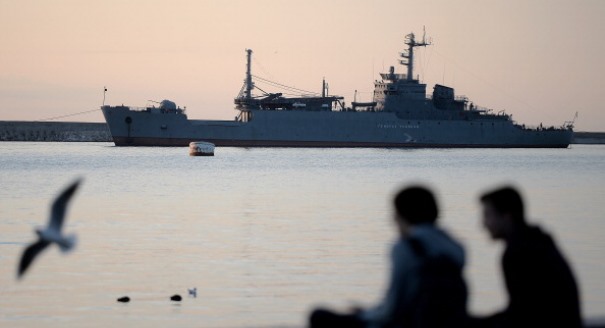Russia’s invasion of Crimea has opened up a division of Europe not seen since the United States went to war against Iraq in 2003. That U.S. decision caused such a deep divide inside NATO that there were fears at the time that the alliance would disintegrate.
In 2003, the countries of Eastern Europe sided with the United States, Britain, and Denmark in attacking Iraq. France and Germany (together with Russia) vehemently opposed military intervention. Old and new Europe were pitted against each other. The transatlantic relationship and the EU were almost torn to bits.
That suited Russia. It had always thrived on a weak and divided Europe and on squabbles between the Europeans and the Americans. Those divisions allowed the Kremlin to play European countries off against each other.
Now, the decision by Vladimir Putin, the Russian president, to invade Crimea and annex it to Russia has given him another wonderful opportunity to weaken the West. What is more, his takeover of Crimea will have far-reaching consequences for the post–Cold War order.
For Poland, the Baltic states, and the Czech Republic, events in Ukraine are more immediate than for Spain, Portugal, or Italy because of the interplay of history and geography. Central European states saw close at hand how old Europe failed to act when Russia attacked Georgia in 2008 and occupied Abkhazia and South Ossetia. And they have witnessed how the EU and the United States have been unable to end Russian influence in Moldova’s breakaway territory of Transnistria.In both cases, these countries’ territorial integrity was undermined. Putin has now done the same in Ukraine.
Poland’s prime minister, Donald Tusk, and the country’s foreign minister, Radek Sikorski, have tried to convince their Western European counterparts of the stakes. If Russia can invade Crimea without any kind of robust EU response, the Western liberal order itself will be undermined. That could encourage Putin to start meddling in even more parts of Europe.
The Polish warnings are not the voices of Cold War warriors. Over the past few years, Warsaw has gone out of its way to try to improve its relations with Moscow. The Tusk government undertook this task because it genuinely wanted a relationship with Russia that would not be poisoned by the past, but would be based on a new kind of predictability.
Russia’s invasion of Crimea, however, revealed Moscow’s old predictability. Putin was not prepared to accept the order that has emerged across Europe following the collapse of the Berlin Wall in November 1989. Nor was he going to embrace the demise of the Soviet Union two years later that spawned an independent Ukraine.
If Putin had accepted this new order, he would have mediated as an honest broker in Transnistria and in the frozen conflict between Armenia and Azerbaijan over the region of Nagorno-Karabakh. But his invasions of Georgia and now Ukraine suggest that he was set on distracting these countries from the democratic path, while making them less attractive partners for the EU and NATO.
Old Europe—in a slightly different constellation from in 2003—has wrung its hands over Putin’s invasion of Crimea. Western European leaders have declared that this is the worst crisis since the end of the Cold War. Yet, it is new Europe, not old Europe, that is most willing to defend the basic yet existential principles of upholding values and territorial integrity.
The decision by Crimea’s regional parliament on March 6 that the peninsula should become part of Russia shows the speed at which the Kremlin is consolidating its grip over this part of Ukraine. Europeans have no political will to prevent this from happening.
Instead, at an emergency summit in Brussels on the same day, EU leaders imposed the mildest of sanctions on Russia. They threatened to impose tougher ones if the Kremlin does not talk to the new interim government in Kiev. But even the stronger U.S. sanctions against Russia that President Barack Obama announced are unlikely to sway Putin.
Leaders in new Europe have few options. They have seen old Europe’s unwillingness to think and act strategically. Indeed, their fallback may now rest with NATO, which could find a new post-Afghanistan narrative to refocus on Europe. If that is the case, Putin may unwittingly have given NATO a new lifeline.






.jpg)